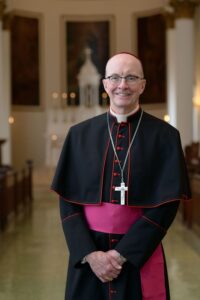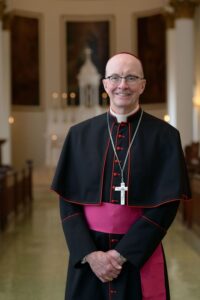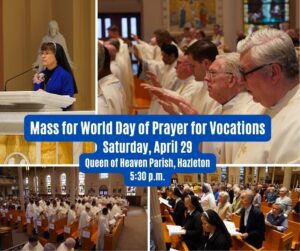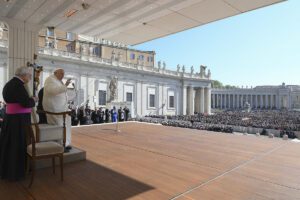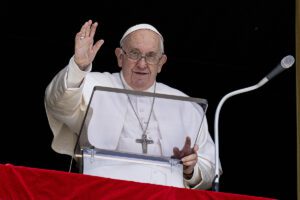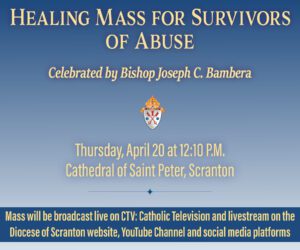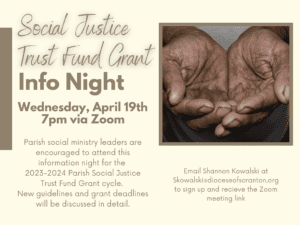VATICAN CITY (CNS) – Pope Francis and Hungarian Prime Minister Viktor Orbán believe strengthening Christian values can make Europe a better place, but they have key differences when describing those values and how they should be promoted.
Pope Francis will visit Hungary’s capital, Budapest, April 28-30. It will be his 41st foreign trip since becoming pope in 2013.
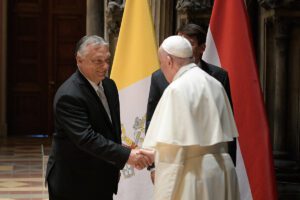
The top issues on the pope’s agenda are likely to be the ongoing war in Ukraine and immigration — pressing issues that will illustrate some common ground and substantial chasms.
Since Russia’s war on Ukraine began in February 2022, Hungary has seen some 2.5 million Ukrainians cross its borders, according to the U.N. Refugee Agency. While the agency reports only about 35,000 of them have requested temporary protection status to remain in Hungary, the Hungarian government and Catholic and other private humanitarian agencies mobilized quickly to assist both those seeking refuge in the country and those simply passing through. A year later, that assistance continues.
Pope Francis will thank Hungary and its people for welcoming their next-door neighbors in need. And he will meet refugees April 29; Matteo Bruni, director of the Vatican press office, said he assumed many of them would be Ukrainians.
But the pope is likely to say something like what Cardinal Michael Czerny, prefect of the Dicastery for Promoting Integral Human Development, told Hungarian officials a year ago: A welcoming attitude should be a permanent part of Hungarian government policy and should be extended to other people seeking refuge, not just Ukrainians.
Since 2015 Orbán has consistently maintained a “no migrants” policy, arguing that “ethnic homogeneity” was an important value for his country.
Pope Francis, while recognizing a nation’s right to control its borders and regulate migration, also insists that people fleeing danger and those seeking a decent life for themselves and their families have a right to move.
Father Csaba Torok, who is responsible for media relations for the Hungarian bishops’ conference, told reporters April 18 that when Pope Francis made a seven-hour visit to Hungary in September 2021 to close the International Eucharistic Congress, Orbán gave him a rather pointed gift: a copy of a letter written by King Bela IV to Pope Innocent IV in 1250 asking for help against Mongol warriors.
“It was a sign,” Father Torok said. “Victor Orbán portrays himself as a defender of Christianity and is intentionally seeking a connection with the pope.”
“Orbán says things that support the church, but he does things that are not always in harmony with church teaching,” the priest said.
Officially, the bishops’ conference and individual bishops have not taken strong public stances against Orbán’s anti-migrant policy, he said. “The Catholic Church in Hungary is not independent in terms of funding. Schools, institutes, hospitals, even dioceses are financed by the state. Whenever political tensions arise, whether internal or external, people prefer not to say anything because there is a risk of jeopardizing the inflow of funds. Should a government become an enemy of the church, it could drive the church to bankruptcy within a few months.”
On the question of the war in Ukraine, Orbán claims he and the pope are on the same page.
In his state of the nation speech in February, the prime minister defended his opposition to sanctions against Russia and to sending weapons or military supplies to Ukraine. His government’s opposition is consistently voiced in meetings of both NATO and the European Union.
The decision to send tanks to Ukraine, Orbán said in the February speech, moved Germany “from the peace camp into the war camp. That left two of us: Hungary and the Vatican. We cannot complain about the company, but we need to address some serious consequences.”
“In essence,” Father Torok said, “what Orbán is saying is: ‘We are the Vatican’s ally and the only country in Europe that protects Christianity; we are doing our utmost for peace in our foreign policy following in the footsteps of the pope.'”
Pope Francis recognizes Ukraine’s right to defend itself, but he also has insisted dialogue is the only way to stop the war. As he told an Italian newspaper in November: Lasting peace cannot be achieved by sending more weapons “because they don’t defeat hatred and the thirst for domination, which will reemerge.”
Orbán has described his policy regarding the war as “strategic calm,” providing humanitarian aid to Ukrainians, but not interrupting Hungary’s strong economic ties with Russia.
Hungary for decades has been trying to promote détente between the Vatican and the Russian Orthodox Church, Father Torok said. Before St. John Paul II visited the country in 1996 attempts were made to plan a meeting there between the pope and then-Patriarch Alexei II of Moscow. The meeting did not take place.
“The Hungarian Catholic Church has consistently tried to serve as a bridge connecting the Orthodox and Roman Catholic Church,” he said. But given the situation with the war, it seems there is “nothing on the table” now.
Still, Bruni, the Vatican press office director, told reporters April 21 that Orthodox delegations could attend some of the papal events in April.
Those delegations likely would include Metropolitan Hilarion of Volokolamsk, who was head of external relations for the Russian Orthodox Church until, without explanation, he was made administrator of the Russian Orthodox Diocese of Budapest and Hungary last June.
Whether or not the pope has direct contact with Russian Orthodox officials in Hungary, what he says about the war will make its way to Moscow.

